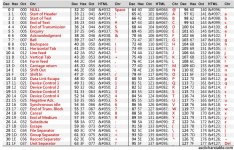byte[] TEST1 = 65 48 48 48 48 ==> ASCII Char expression ===> A 0 0 0 0
byte[] TEST2 = 48 65 48 48 48 ==> ASCII Char expression ===> 0 A 0 0 0
I want byte addition.
So the result I want is ====> TEST1 ( 65 48 48 48 48 ) + TEST2 ( 48 65 48 48 48 ) = 65 65 48 48 48 or ASCII Char expression A A 0 0 0
How to code in C#?
Please help me ㅠㅠ
byte[] TEST2 = 48 65 48 48 48 ==> ASCII Char expression ===> 0 A 0 0 0
I want byte addition.
So the result I want is ====> TEST1 ( 65 48 48 48 48 ) + TEST2 ( 48 65 48 48 48 ) = 65 65 48 48 48 or ASCII Char expression A A 0 0 0
How to code in C#?
Please help me ㅠㅠ
Last edited by a moderator:



